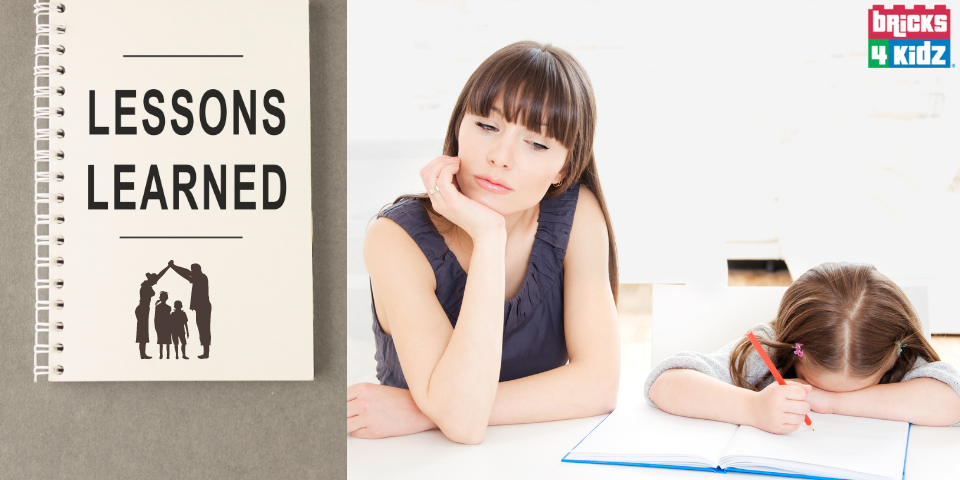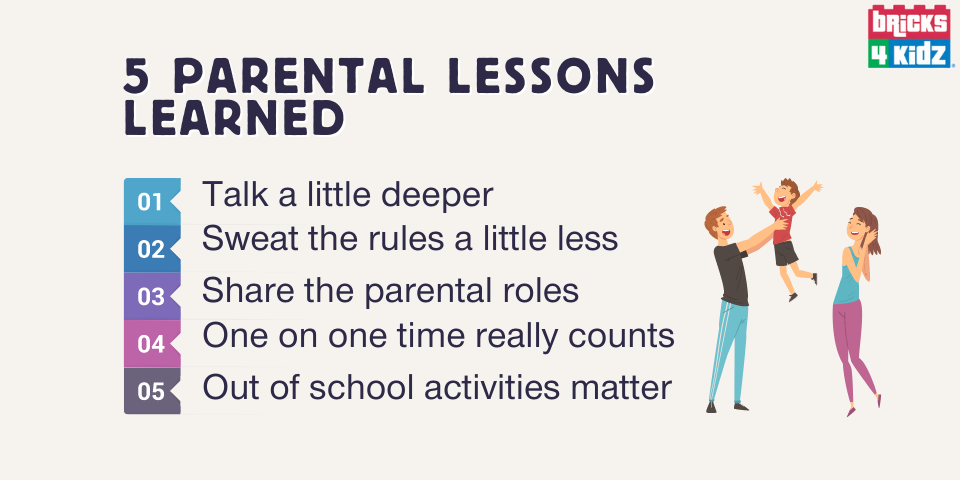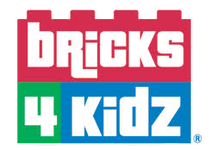5 Parental Lessons Learned 📜

Written by a Newcastle mum of 25 years.
“Parenting can be tough. Upon reflection, I wish I knew how important these aspects were. I would have included more of these activities into our lives.”
My kids are now grown. I raised 4 beautiful kids now adults; eventually, they turned out great! When my kids were young, at times they gave us grief, the least my youngest. I think that by the time I raised the first 3 children, I knew the recipe to raise a child a little better! For 2 of the 4 children, it took until they were adults for them to realise I did my best and that I was a good parent despite my failings.
Together, we have spoken about what I did well, why my elder girls were angry at me, and what I could have done better in raising them, especially in their early years. Here is what I learned I could have improved upon. It took a humble pill to digest these truths.
What surprised me is that the things that my children were negative about, I had no idea how they perceived things as they did! It made me realise the perceptions of a child and the memories they form around their experiences are different from my perception and experience. No matter how hard you try as a parent, there will be times when you feel not good enough for the job, but you are! You will fail at times, that is a part of life as we cannot be everything, we have lessons ourselves to learn.
Here are 5 things I wish I paid more attention to when my children were younger:
1. When your child answers how their day was, do not be satisfied with a one-word answer
Being present for your child and making sure they are present with you is so important. When my children were young, they would meet me at the car or walk through the front door where I made sure I was always there to greet them with a smile to say, “hello, how was your day?” Often, my child would say, “Hey mum, I’m good or I’m okay” and then proceeded to their room to drop their bag and pick up their toys.
I took what they said at face value, most of the time they were good but sometimes when they were just okay, they were not, and I had no idea that they were not doing well until years later. How could I have missed this? In adulthood, I was told the truth that when they said they were okay they were sometimes miserable from being bullied, having friend issues, throwing school letters in the bin, and failing school tests. All unbeknownst to me!
Children, like adults, learn young to stay strong and my kids learned to hold a tough upper lip. Most of the issues I knew about but some were missed. My eldest daughter did not communicate some of her troubles to me, simply because she was too tired when she walked into the house, she did not want to worry me but most of all she was concerned that if I knew what was happening, I would try to resolve the issues, placing her in a trickier situation. If only I had known what was going on, I could have saved her years of bullying.
So next time your child says they are okay to you, are they? Do probe a little deeper. Wait for the right time to ask your child how their day was (not the moment they walk through the door) and take time to have parent-child dates to connect on a deeper level about how they are going. Encourage them to open up about what is happening.
2. One on one time will bring you closer
With 4 children, one with ADD, a husband who has high anxiety, all wanting attention from me at the same time, it can be demanding parenting! Our family members feel important and valued when they are each given attention. Each of us has different personalities, some are extroverts and demand they get attention, while some are introverts who never demand attention but always notice if they are not getting it.
My second eldest child is an introvert who always waits patiently for attention but is often outspoken by her elder sister. It was often that she was overshadowed in group settings and she would stay quiet hanging in the background. I tried my best to balance the situation by encouraging her involvement, but it was often extremely hard for her to be heard with her subtleness and soft tones under the noise.
My introverted daughter would often think to express her ideas, but she would not get to enough. She would end up feeling unheard and be upset that things would turn out differently from how she had envisioned. Yet seldom did she ever even communicate her thoughts and the problem she may have had with a given situation despite encouragement from me.
It is so important that we can show our children we care about them and that we want to listen to them. When we make our children our priority, we will see our relationships with them build. Take time out and go on outings one on one together. Having a mummy or daddy-daughter date will make your child feel special and heard. For a while my child did not feel heard enough, now she is older we go on beach and coffee dates all the time! We are closer than ever.
3. Do not sweat the small rules
How many times in a day do your kids break the rules? Not often? Really? For me, too many!
As a young mum, I felt I had to address every misconduct with firmness. My older kids were reprimanded a lot more than my younger children. By the time I had my youngest, I was tired of all the challenges, and I never demanded obedience from her. I simply mentioned how things could have been and questioned her. Whereas with my first two children I was laborious in the way I spoke to them about problems, I felt that I had to firmly correct behaviour, how wrong I was!
The funny thing is my youngest daughter who was reprimanded way less was much easier to raise. It seemed to me the more I enforced the rules firmly with my older children the more resistance I had to them following the rules. That is not to say that rules are not important! I recognize this fact, but I also recognise that we cannot control every little issue. We should not sweat the fact our children are breaking the rules and instead calmly correct behaviour.
Here is some behaviour advice from Justin Coulson (my past friend), Ph.D. in child psychology: “When we remember that challenging behaviour comes from unmet needs, and we see that challenging behaviour as a chance to get close to our children and problem-solve with them, we build our relationships rather than tear them down.” 18 ways to a resilient child – Justin Coulson PhD I recommend his child psychology work thoroughly.

4. Play with your kids for more time
Stop saying I am busy, I will play with you soon. The dishes can wait. Messaging can wait. It is time to turn off your smartphone, make eye contact, and spend time with the most important people in your life.
My eldest child said to me, “I wish you had paid more attention to games and that you played with me more.” In our home, we resumed our roles, I was the mum who put the kids to bed, read them the nightly stories, and I comforted them in need. I was a busy mum who was better at taking care of their physical and emotional needs but was not particularly good at playing (unless I was at a forest or beach), so we made playing for the most part dad’s job. While dad was playing superman, building Lego, turning laundry baskets into spaceships, or building cubby houses out of boxes in the lounge room with the kids, I was planning the next day.
When one of the kids needed to be shuttled somewhere… I was it! I was their everything in need, I would refer to myself as a single mum (I do think that wrong now!) and as the children got older the workload got tiring, doing many things all by myself! I loved being needed but I soon realised that the kids did not ask for anything from their dad unless it was time to play! It occurred to me one day that by taking care of it all, I was robbing my husband of taking care of an important part of their day-to-day life.
Likewise, my husband is the guy that the children went to for games, I was missing out on much of the fun! Playing did not come so naturally to me, I needed to step in to play and stay in play (not just for 2 minutes!), I find it hard to be present. So it was important for me to actively participate in play not just for the kids but for my husband and me. This husband-and-wife team needed to adjust their roles to support our kids in all aspects of life! Are your roles balanced?
Take time to know what your child is doing and learn what interests them. Learn the detail of why your child likes what they like. Try to engage with your child and like what interests them. By doing so you will be bonding with them more deeply, they will feel appreciated, and you will get earn respect. You will also find more emotional balance yourself.
Types of play – physical play (dancing, sports), social play (games, playing in groups), constructive play (building toys like LEGO®), fantasy play (drama)
5. Extra-curricular activities have a profound impact on their development
Playtime activities help contribute to children’s overall development. As a young mum, I knew this, but I did not know just how significant it would be to my children’s well-being in many ways. If I could do one thing over as a parent, involving them in more team sports would have to have been my number one priority. Rather than extending my home loan to build that awesome pool, I would have been better off putting my money into my children’s extracurricular activities.
I also should have insisted my children continue with the extracurricular activity that they decided upon after the initial excitement of the dream activity wore off. My youngest daughter I am sure would have been an amazing dancer as she still dances to this day, but she insisted I pull her out of dance, at the time saying she said she did not like it, but the truth is she was just fibbing as she was feeling too shy around the other children in her class. She regrets to this day that she never pursued a dancing career.
Participating in extracurricular activities helps kids in so many ways:
- Helping them to understand routine
- Providing kids with opportunities to socialise
- Allowing kids to have a break from home and studies
- Developing a child into a well-rounded, independent, and self-assured adult
- Equipping children with important learning they need to be successful
Being involved in extracurricular activities can add to a child’s personal development. There is plenty of school activities for your children in Newcastle. Team sports are great to develop confidence and social skills. Try soccer, football, netball, baseball, basketball, anything where working together as a team is required.
For creative development try extra-curricular activities like piano and art classes. LEGO® afterschool classes will help with creative development and STEM-based (Science, Technology, Engineering, and Mathematical) learning. These classes are not just about talent, they have far-reaching positive impacts.
My children did develop artistic talents as we spent time in music and art lessons, but I wish I had of got them more involved in group activities. Eventually, my introverted children grew out of being shy, but it took a lot longer to find confidence than I believe it would of if I had of got them participating more out of school classes at an earlier age.
As a parent, these were just 5 of many lessons that I learned in my parenting journey. We all will learn many lessons along the way. Parenting is far from perfect, I thought I was quite perfect until my adult kids told me otherwise but at the end of the day, loving your kids, doing your best, and trying to grow young children into responsible adults who are kind is what matters. Most of us will achieve this success for our children. Now that my children are adults I can say that they are “good people” and they make me proud, and they say “I’m the best mum ever” even if we did have a few challenges along the way!
Want to read more articles like this?
Photo Gallery
This message is only visible to admins:
Unable to display Facebook posts
Type: OAuthException
Code: 100
Click here to Troubleshoot.
We Learn, We Build, We Play with LEGO® Bricks
Copyright © 2015 Bricks 4 Kidz. All rights reserved. PRIVACY POLICY | CORPORATE CONTACT
LEGO® and DUPLO® are registered trademarks of the LEGO® Group of companies which does not sponsor, authorize or endorse these programs or this web site.
